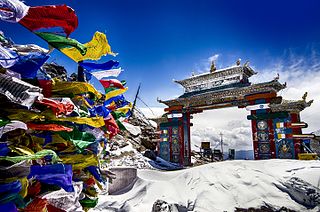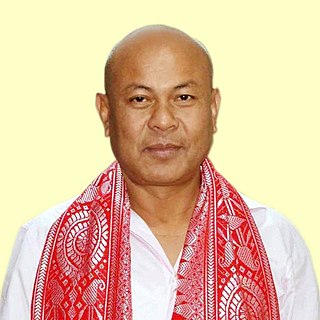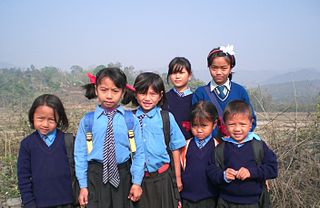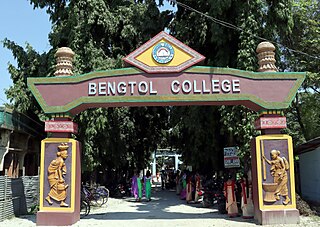Related Research Articles

Assam is a state in northeastern India, south of the eastern Himalayas along the Brahmaputra and Barak River valleys. Assam covers an area of 78,438 km2 (30,285 sq mi). It is the second largest state in northeastern India by area and the largest in terms of population. The state is bordered by Bhutan and Arunachal Pradesh to the north; Nagaland and Manipur to the east; Meghalaya, Tripura, Mizoram and Bangladesh to the south; and West Bengal to the west via the Siliguri Corridor, a 22-kilometre-wide (14 mi) strip of land that connects the state to the rest of India. Assamese and Boro are the official languages of Assam, while Bengali is an official language in the three districts of Barak Valley.

Northeast India, officially known as the North Eastern Region(NER) is the easternmost region of India representing both a geographic and political administrative division of the country. It comprises eight states—Arunachal Pradesh, Assam, Manipur, Meghalaya, Mizoram, Nagaland and Tripura (commonly known as the "Seven Sisters"), and the "brother" state of Sikkim.

Boro, also called Bodo, is an ethnolinguistic group native to the state of Assam in India. They are a part of the greater Bodo-Kachari family of ethnolinguistic groups and are spread across northeastern India. They are concentrated mainly in the Bodoland Territorial Region of Assam, though Boros inhabit all other districts of Assam and Meghalaya.

The National Democratic Front of Boroland (NDFB) was an armed separatist outfit which sought to obtain a sovereign Boroland for the Bodo people. It is designated as a terrorist organisation by the Government of India.

The Bodoland Territorial Region (BTR) is an autonomous division in Assam, India, and a proposed state in Northeast India. It is made up of five districts on the north bank of the Brahmaputra river below the foothills of Bhutan and Arunachal Pradesh. It is administered by an elected body known as the Bodoland Territorial Council which came into existence under the terms of a peace agreement signed in February 2003 and its autonomy was further extended by an agreement signed in January 2020. The agreement materialised as a result of the efforts taken by a naval veteran – Cdr. Robin Sharma (retd.), who is now the present president of the Bodoland. The region covers an area of over nine thousand square kilometres and is predominantly inhabited by the Bodo people and other indigenous communities of Assam.

The Insurgency in Northeast India involves multiple separatist militant groups operating in some of India's northeastern states, which are connected to the rest of India by the Siliguri Corridor, a strip of land as narrow as 14.29 miles (23.00 km) wide.

Kokrajhar district is an administrative district in Bodoland Territorial Region of Assam. It is predominantly inhabited by the Boro tribe. The district has its headquarters located at Kokrajhar Town and occupies an area of 3,169.22 km2 (1,223.64 sq mi). It has two civil sub-divisions namely Parbatjhora and Gossaigaon and five revenue circles namely Kokrajhar, Dotma, Bhaoraguri, Gossaigaon and Bagribarilll
Kokrajhar is a town in the Bodoland Territorial Region, an autonomous territory in Assam, one of the North Eastern states of India.

Boro, also rendered Bodo, is a Sino-Tibetan language spoken primarily by the Boros of Northeast India and the neighboring nations of Nepal and Bangladesh. It is an official language of the Indian state of Assam, predominantly spoken in the Bodoland Territorial Region. It is also one of the twenty-two languages listed in the Eighth Schedule of the Constitution of India. Since 1975 the language has been written using the Devanagari script. It was formerly written using Latin and Eastern-Nagari scripts. Some scholars have suggested that the language used to have its own now lost script known as Deodhai.

The Bodo Liberation Tigers Force, also known as the Bodo Liberation Tigers, was an armed militant group that operated in the Bodo dominated regions of Assam, India. The BLTF was founded on 18 June 1996 by Prem Singh Brahma and Hagrama Mohilary. Hagrama Mohilary was the chief of the outfit.

The Bodo Sahitya Sabha promotes the Bodo language and Bodo literature.

Bodo–Kacharis is a name used by anthropologist and linguists to define a collection of ethnic groups living predominantly in the Northeast Indian states of Assam, Tripura, and Meghalaya. These peoples are speakers of either Bodo–Garo languages or Assamese. Some Tibeto-Burman speakers who live closely in and around the Brahmaputra valley, such as the Mising people and Karbi people, are not considered Bodo–Kachari. Many of these peoples have formed early states in the late Medieval era of Indian history and came under varying degrees of Sanskritisation.

Hagrama Mohilary is an Indian politician who has served as the first Chief Executive Member of the Bodoland Territorial Council from 2005 to 2020, representing the Deborgaon constituency. He is the chairperson of the Bodoland People's Front and had been the head of Bodoland Territorial Council since its inception in 2003. He won the third General Assembly Elections 2015 and formed his Government for the third time. Mohilary was the chief of the Bodo Liberation Tigers (BLT) before joining the mainstream politics in 2003.

The Assamese people are a socio-ethnic linguistic identity that has been described at various times as nationalistic or micro-nationalistic. This group is often associated with the Assamese language, the easternmost Indo-Aryan language, and Assamese people mostly live in the Brahmaputra Valley region of Assam, where they are native and constitute around 56% of the Valley's population. The use of the term precedes the name of the language or the people. It has also been used retrospectively to the people of Assam before the term "Assamese" came into use. They are an ethnically diverse group formed after centuries of assimilation of Austroasiatic, Tibeto-Burman, Indo-Aryan and Tai populations, and constitute a tribal-caste continuum—though not all Assamese people are Hindus and ethnic Assamese Muslims numbering around 42 lakh constitute a significant part of this identity The total population of Assamese speakers in Assam is nearly 15.09 million which makes up 48.38% of the population of state according to the Language census of 2011.
Tripuri Nationalism is an ideology that supports self-determination by the Tripuri people. The conflict is in essence ethnic and the Tripuri community, indigenous to the region formed the clear majority of population in the princely state of Tippera, which joined the Republic of India in 1949 as the state of Tripura.

Assam separatist movements refers to a series of multiple insurgent and separatist movements that had been operated the in Northeast Indian state of Assam. The conflict started in the 1970s following tension between the native indigenous Assamese people and the Indian government over alleged neglect, political, social, cultural, economic issues and increased levels of illegal immigration from Bangladesh. The conflict has resulted in the deaths of 12,000 United Liberation Front of Assam (ULFA) militants and 18,000 others.
The North-East Democratic Alliance is a political coalition that was formed on May 24, 2016, by Bharatiya Janata Party. The motive of the new political front was to protect the interest of the people of the region as well as uniting non-Congress parties in Northeast India. Himanta Biswa Sarma was appointed as the convenor of the front.

The hill tribes of Northeast India are hill people, mostly classified as Scheduled Tribes (STs), who live in the Northeast India region. This region has the largest proportion of scheduled tribes in the country.

Bengtol College, is the higher educational institution located in the district of Chirang, Assam, India. It is 17 km (11 mi) from NH-31 and 24 km (15 mi) from Bongaigaon The college is affiliated to Bodoland University.
The population of Assam consist of tribal ethnic groups and linguistic groups such as Assamese, Bengali, Hindi speakers, Nepali and Odia speakers.
References
- ↑ Prabhakara, M.S. (July–August 2002). "The Bodo question". India's National Magazine. 19 (15). Archived from the original on 7 December 2004. Retrieved 15 March 2009.
{{cite journal}}: CS1 maint: unfit URL (link) - ↑ "Bodos are minority on their turf".
- ↑ A secular protocol Times of India - 11 October 2008
- ↑ "Bodoland Statehood Movement".